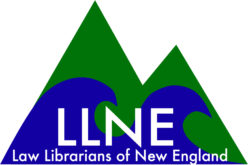This Spring, some of the creators of the LLNE Legal Link presented about legal reference resources for public non-law librarians at the Rhode Island Library Association Annual Conference. The public non-law librarians in the audience gave several helpful suggestions about how to improve and enhance Legal Link and this discussion of how to get to no was one of the recommended additions to the site.
Several public non-law librarians stated that one of the biggest challenges with legal reference questions is that they realized they had to set limits and not answer a question and then they had to deal with what it felt like to tell a patron no. One librarian said that her training and her experience has taught her to always try and be as helpful as possible but with legal references questions she just felt so bad about saying no because it felt like she was going against her reference training and practice.
While we could discuss why saying no is important in the legal reference context, (and we have on this page) we wanted to reserve some space to discuss how to get yourself to no and how to feel ok with it.
Librarians Aren’t Practicing Attorneys
A patron comes to your desk and asks for a legal form. While your librarian skills may be able to help your patron find a form, you might not be able to verify whether this is the form your patron needs. That’s ok! While many legal reference librarians are lawyers, they are not practicing attorneys and neither are you! You are not in the business of giving legal advice. Instead, librarians – whether in a law library or a local public library – can help patrons find the law but can neither interpret nor offer legal advice. Sometimes a patron really wants legal advice when posing her request as a reference question. Although it is sometimes difficult to resist helping someone who clearly needs help, these patrons need the help of a lawyer — not a reference librarian. Give yourself permission to not be an expert on the law. Instead, refer patrons to those professional qualified and compensated for this service.
Saying Yes to a Referral is Not Saying No to a Patron
As a public librarian in a non-law library you have the opportunity to refer patrons to a local public law library and/or an attorney. This is not turning away a patron who needs help, rather this is connecting him/her with a more appropriate level of expertise. If you are unsure of where to refer your patron, call your local public law library and ask to speak with a reference librarian. The librarian who you connect with may be able to find resources to help your patron on the spot or may be able to advise you on how to proceed with the request. In addition, referring a patron to a legal aid organization, a law school clinic, or a bar association law referral service is another way to help your patron.
Be Proactive, not Reactive
One of the things that I found helpful when saying no or setting limits was having rote language I could rely on to set the limit for me. This has worked best for me in emailed reference questions, but can also work well for in person, phone, and chat questions. I make sure to explain to my patron that I am not a practicing attorney and cannot, by law, give advice or interpret the law. Framing the issue as something I cannot do instead of something I choose not to do can help the patron understand the limits. As Terrye Conroy points out, “displaying a written policy or disclaimer that explains what you can do and what you cannot do to help a patron research a legal problem can be an effective first step toward drawing that line.” Having a policy in place or simple language you rely on is the first step.
Phone a Friend
Setting limits with a patron or saying no to a patron who is in legal trouble – whether criminal or civil – can be difficult. It can sometimes feel like you’re letting the patron down. One way I handle it is by phoning a friend. Sometimes when I have a particularly difficult reference interaction I wonder if there was something else I could have done or something different I could have done. To work through these feelings, I call up another law librarian I trust and ask him/her. Bouncing ideas off another person with another set of experiences might inform my reference work. I might also find that another librarian might have done the exact same thing I did – confirming that it is just not a question I can answer. Either way, talking out the interaction with a law librarian can help me deal with my lingering feelings of frustration or disappointment. Please feel free to reach out to one of the members of the Legal Link team to discuss your legal reference questions. We are always happy to be of service!
Getting to no is sometimes difficult for library staff who are so used to getting to yes with reference questions. Setting limits on patrons with legal questions is necessary and important, even if it might feel uncomfortable. The best way to work through these issues is to discuss them with your staff and administration. You might even consider having a policy in place to help guide your responses to patrons. If you have questions about when and how to set limits, please feel free to contact a member of the Legal Link team!
